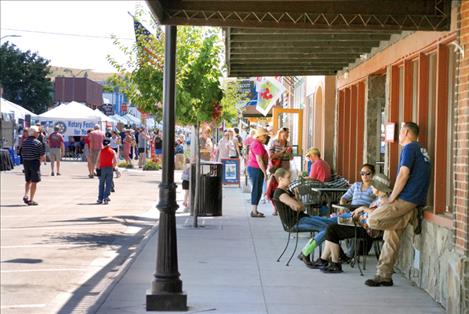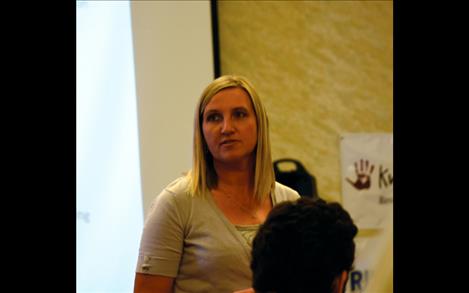City’s Economic Development Council unveils resort tax proposal
Hey savvy news reader! Thanks for choosing local.
You are now reading
2 of 3 free articles.
POLSON — The Polson Chamber of Commerce monthly luncheon on Aug. 5 provided more than just a hearty bowl of soup and a sandwich.
Attendees got a preview of the City of Polson’s Economic Development Council’s work on a proposal for a resort tax. After Polson City Commission voted to form the council on April 1 and appointed a diverse group of people to the board, the council began work in May. Its first task was to look at the possibility of a resort tax for Polson, if there was enough interest, which the committee felt there was.
To be classified a resort community, the Department of Commerce requires that the town be an incorporated city with a population of less than 5,500 people; must derive the primary portion of its economic well being from employment related to the recreational and personal needs of persons traveling to or through the municipality; and must have been designated a resort community by the DOC. Polson meets all three criteria.
“Resort taxes serve the function of creating a funding source for designated resort areas to finance a variety of services. It allows communities with high numbers of visitors but relatively few residents, to manage the wear and tear on local infrastructure without overburdening local citizens,” according to the DOC.
The EDC suggested a 3 percent resort tax, the highest amount allowed, to be collected from April 1 to Sept. 30 for 20 years. Then the tax would have to be voted on again.
The proposed resort tax would take 3 percent off the top to vendors for implementation and collection. The City of Polson would receive 80 percent for street reconstruction and preservation including sidewalks, curb and gutter and storm drainage. Fifteen percent of any tax collected would go for property tax relief in the form of rebates on property tax bills for Polson residents. For the remaining 5 percent, 3 percent of any tax collected would go to the City for administration and the remaining two percent to promote Polson.
Items to be taxed would be the retail value of hotels, motels and other lodging or camping facilities; restaurants, fast food and other food service establishments; taverns, bars, night clubs, lounges, and other public establishments that serve beer, wine, liquor or other alcoholic beverages by the drink; and destination ski resorts or other destination recreational facilities.
Luxuries are defined by Montana Code Annotated as “any gift item, luxury item or other item normally sold to the public or to transient visitors or tourists. It does not include food purchased unprepared or unserved, medicine, medical supplies and services, appliances, hardware supplies and tools, or any necessities of life.”
Any person purchasing an item deemed a luxury item, good or service would pay the tax.
Suggested luxury items are:
Attractions
— Arcades
— Bowling
— Concerts
— Golf
— Movies and live
theater
— Rodeos
— Gate admissions and concessions
Rentals
— Autos, trucks, trailers, RVs, etc.
— Conference,
convention or event rooms
— Pavilions and park shelters
— Marina boat slips
— Party and tent rentals
— Golf, ski and sports equipment
— Motorcycles, bicycles, ATVs, etc.
— Movie videos and games
— Boats, jet skis and other watercraft
Services
— Guides and outfitters such as hunting, fishing, rafting, horseback rides, etc.
— Wedding and event planners
— Catering services
Retail sales of the
following:
— Batteries and film
— Cameras and supplies
— Books, including used books
— Candles
— Clothing
— Curios, decorative boxes and vases
— Cut flowers and floral arrangements
— Artificial flowers, trees and plants
— Finished craft items, including items sold at craft fairs
— Fireworks
— Gifts, gift tags, gift boxes and wrapping paper
— Jewelry and artwork
— Magazines and
greeting cards
— Makeup and supplies, tanning lotions
— Motorcycles, boats, jet skis, etc.
— Perfume, cologne
— Pictures and picture frames, posters, etc.
— Records, tapes, CDs, videos, DVDs
— Secondhand items, antiques, pawn shop items
— Souvenirs, imprinted and gift items
— Sporting goods
including used and consignment
— Tobacco, tobacco
products,
e-cigarettes and delivery systems
— Toys
— Food delivery charges, but not tips
— Chips, nuts and seeds, granola bars, jerky
— Foodstuffs intended for immediate human consumption
— Soda pop, gum and candy
— Vending machine items
— Alcoholic beverages sold by the drink or at retail
The resort tax, if approved, would be collected at the cash register. It would be 3 percent.
The tax, if approved, would be collected by any vendor within the city limits selling a product that’s labeled a luxury between April 1 and Sept. 30.
The City would provide forms for calculation and payment. They would be remitted monthly — by the 15th of the following month.
Resort tax collections would not be public information since it’s legally required that the administrator collecting the tax maintain privacy.
The City would hire an auditor to randomly audit 10 to 12 businesses each year for compliance.
The next steps for the resort tax are public meetings. The first one is scheduled for Aug. 19 at 6:30 p.m. at the Polson Middle School lunchroom. After additional public meetings, the EDC would send their recommendation to the Polson City Commission to place or not place the resort tax on the ballot.
Then the EDC recommended a special election on the issue in February of 2016. At that election, residents would vote on the issue. If approved, the Polson City Commission would pass a resort tax ordinance and work with vendors to establish collection methods. Tax collection would begin in July of 2016.
Members of the commission are Paul Briney, Gerry Browning, Lewis Cross, Cindy Dooley, staff representative, Becky Dupuis, Rich Forbis, Rick LaPiana, Carlisa London and Jill Southerland, city commission representative.
The commission researched other Montana communities who have instituted a resort tax. Those communities Big Sky, Cooke City, Craig, Gardiner, Red Lodge, St. Regis, Virginia City, West Yellowstone and Whitefish.

















